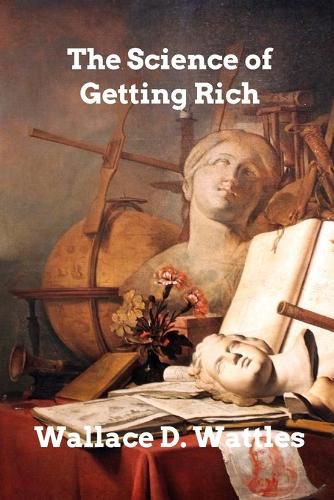Readings Newsletter
Become a Readings Member to make your shopping experience even easier.
Sign in or sign up for free!
You’re not far away from qualifying for FREE standard shipping within Australia
You’ve qualified for FREE standard shipping within Australia
The cart is loading…






This title is printed to order. This book may have been self-published. If so, we cannot guarantee the quality of the content. In the main most books will have gone through the editing process however some may not. We therefore suggest that you be aware of this before ordering this book. If in doubt check either the author or publisher’s details as we are unable to accept any returns unless they are faulty. Please contact us if you have any questions.
The Science of Getting Rich is a book written by the New Thought Movement writer Wallace D. Wattles and published in 1910 by the Elizabeth Towne Company. The book is still in print. According to USA Today, the text is "divided into 17 short, straight-to-the-point chapters that explain how to overcome mental barriers, and how creation, rather than competition, is the hidden key to wealth attraction. This book is based on the Hindu philosophies that One is All, and that All is One (Page one of Preface). The Science of Getting Rich is based upon what Wattles called "the Certain Way of Thinking." According to Mitch Horowitz, the editor-in-chief of the Jeremy Tarcher imprint of Penguin Books, which reprinted The Science of Getting Rich in 2007, Wattles' "Certain Way" descended from the "mental healing movement" that had started earlier with Phineas P. Quimby in the mid-19th century. As Horowitz explained to a reporter from the Washington Post, after experiencing relief from physical symptoms of discomfort or illness through Quimby's mental strategies, people began to wonder, "If my state of mind seems to have a positive influence over how I feel physically, what other things can it do? Can it lead to prosperity? Can it lead to happiness in my home? Can it lead to finding love and romance?" One result of such questioning was Wattles's application of Quimbian "mental healing" strategies to financial as well as physiological situations.
$9.00 standard shipping within Australia
FREE standard shipping within Australia for orders over $100.00
Express & International shipping calculated at checkout
This title is printed to order. This book may have been self-published. If so, we cannot guarantee the quality of the content. In the main most books will have gone through the editing process however some may not. We therefore suggest that you be aware of this before ordering this book. If in doubt check either the author or publisher’s details as we are unable to accept any returns unless they are faulty. Please contact us if you have any questions.
The Science of Getting Rich is a book written by the New Thought Movement writer Wallace D. Wattles and published in 1910 by the Elizabeth Towne Company. The book is still in print. According to USA Today, the text is "divided into 17 short, straight-to-the-point chapters that explain how to overcome mental barriers, and how creation, rather than competition, is the hidden key to wealth attraction. This book is based on the Hindu philosophies that One is All, and that All is One (Page one of Preface). The Science of Getting Rich is based upon what Wattles called "the Certain Way of Thinking." According to Mitch Horowitz, the editor-in-chief of the Jeremy Tarcher imprint of Penguin Books, which reprinted The Science of Getting Rich in 2007, Wattles' "Certain Way" descended from the "mental healing movement" that had started earlier with Phineas P. Quimby in the mid-19th century. As Horowitz explained to a reporter from the Washington Post, after experiencing relief from physical symptoms of discomfort or illness through Quimby's mental strategies, people began to wonder, "If my state of mind seems to have a positive influence over how I feel physically, what other things can it do? Can it lead to prosperity? Can it lead to happiness in my home? Can it lead to finding love and romance?" One result of such questioning was Wattles's application of Quimbian "mental healing" strategies to financial as well as physiological situations.